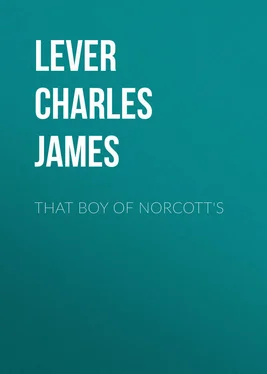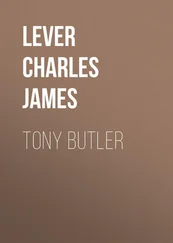Charles Lever - That Boy Of Norcott's
Здесь есть возможность читать онлайн «Charles Lever - That Boy Of Norcott's» — ознакомительный отрывок электронной книги совершенно бесплатно, а после прочтения отрывка купить полную версию. В некоторых случаях можно слушать аудио, скачать через торрент в формате fb2 и присутствует краткое содержание. Издательство: Иностранный паблик, Жанр: literature_19, foreign_antique, foreign_prose, на английском языке. Описание произведения, (предисловие) а так же отзывы посетителей доступны на портале библиотеки ЛибКат.
- Название:That Boy Of Norcott's
- Автор:
- Издательство:Иностранный паблик
- Жанр:
- Год:неизвестен
- ISBN:нет данных
- Рейтинг книги:4 / 5. Голосов: 1
-
Избранное:Добавить в избранное
- Отзывы:
-
Ваша оценка:
- 80
- 1
- 2
- 3
- 4
- 5
That Boy Of Norcott's: краткое содержание, описание и аннотация
Предлагаем к чтению аннотацию, описание, краткое содержание или предисловие (зависит от того, что написал сам автор книги «That Boy Of Norcott's»). Если вы не нашли необходимую информацию о книге — напишите в комментариях, мы постараемся отыскать её.
That Boy Of Norcott's — читать онлайн ознакомительный отрывок
Ниже представлен текст книги, разбитый по страницам. Система сохранения места последней прочитанной страницы, позволяет с удобством читать онлайн бесплатно книгу «That Boy Of Norcott's», без необходимости каждый раз заново искать на чём Вы остановились. Поставьте закладку, и сможете в любой момент перейти на страницу, на которой закончили чтение.
Интервал:
Закладка:
Remembering how all mention of my father used to affect my mother long ago, seeing how painfully his mere name acted upon her, I forbore to speak of this incident, and buried it in my heart, to think and ruminate over when alone.
Time went on and on till I wanted but a few months of twelve, and my lessons were all but dropped, as my mother’s mornings were passed either in letter-writing or in interviews with her lawyer. It was on the conclusion of one of these councils that Mr. McBride led me into the garden, and, seating me beside him on a bench, said, “I have something to say to you, Digby; and I don’t know that I ‘d venture to say it, if I had not seen that you are a thoughtful boy, and an affectionate son of the best mother that ever lived. You are old enough, besides, to have a right to know something about yourself and your future prospects, and it is for that I have come out to-day.” And with this brief preface he told me the whole story of my father’s and mother’s marriage and separation; and how it came to pass that I had been taken from one to live with the other; and how the time was now drawing nigh – it wanted but two months and ten days – when I should be once more under my father’s guidance, and totally removed from the influence of that mother who loved me so dearly.
“We might fight the matter in the courts, it is true,” said he. “There are circumstances which might weigh with a judge whether he ‘d remove you from a position of safety and advantage to one of danger and difficulty; but it would be the fight of a weak purse against a strong one, not to say that it would also be the struggle of a poor mother’s heart against the law of the land; and I have at last persuaded her it would be wiser and safer not to embitter the relations with your father, – to submit to the inevitable; and not improbably you may be permitted to see her from time to time, and, at all events, to write to her.” It took a long time for him to go through what I have so briefly set down here; for there were many pros and cons, and he omitted none of them; and while he studiously abstained from applying to my father any expression of censure or reprobation, he could not conceal from me that he regarded him as a very cold-hearted, unfeeling man, from whom little kindness could be expected, and to whom entreaty or petition would be lost time. I will not dwell on the impression this revelation produced on me, nor will I linger on the time that followed on it, – the very saddest of my life. Our lessons were stopped, – all the occupations that once filled the day ceased, – a mournful silence fell upon us, as though there was a death in the house; and there was, indeed, the death of that peaceful existence in which we had glided along for years, and we sat grieving over a time that was to return no more. My mother tried to employ herself in setting my clothes in order, getting my books decently bound, and enabling me in every way to make a respectable appearance in that new life I was about to enter on; but her grief usually overcame her in these attempts, and she would hang in tears over the little trunk that recalled every memory she was so soon to regard as the last traces of her child. Biddy, who had long, for years back, ceased to torment or annoy me, came back with an arrear of bitterness to her mockeries and sneers. “I was going to be a lord, and I’d not know the mother that nursed me if I saw her in the street! Fine clothes and fine treatment was more to me than love and affection; signs on it, I was turning my back on my own mother, and going to live with the blackguard” – she did n’t mince the word – “that left her to starve.” These neatly turned compliments met me at every moment, and by good fortune served to arm me with a sort of indignant courage that carried me well through all my perils.
To spare my poor mother the pain of parting, Mr. McBride – I cannot say how judiciously – contrived that I should be taken out for a drive and put on board the packet bound for Holyhead, under the charge of a courier, whom my father had sent to fetch me, to Brussels, where he was then living. Of how I left Ireland, and journeyed on afterwards, I know nothing; it was all confusion and turmoil. The frequent changes from place to place, the noise, the new people, the intense haste that seemed to pervade all that went on, addled me to that degree that I had few collected thoughts at the time, and no memory of them afterwards.
From certain droppings of the courier, however, and his heartily expressed joy as Brussels came in sight, I gathered that I had been a very troublesome charge, and refractory to the very limit of actual rebellion.
CHAPTER III. WITH MY FATHER
At the time I speak of, my father dwelt in a villa near Brussels, which had been built by or for Madame Malibran. It was a strange though somewhat incongruous edifice, and more resembled a public building than a private gentleman’s residence. It stood in a vast garden, or rather park, where fruit and forest trees abounded, and patches of flowers came suddenly into view in most unexpected places. There were carriage drives, too, so ingeniously managed that the visitor could be led to believe the space ten times greater than it was in reality. The whole inside and out savored strongly of the theatre, and every device of good or bad taste – the latter largely predominating – had its inspiration in the stage.
As we drove under the arched entrance gate, over which a crowned leopard – the Norcott crest – was proudly rampant, I felt a strange throb at my heart that proved the old leaven was still alive within me, and that the feeling of being the son of a man of rank and fortune had a strong root in my heart.
From the deep reverence of the gorgeous porter, who wore an embroidered leather belt over his shoulder, to the trim propriety and order of the noiseless avenue, all bespoke an amount of state and grandeur that appealed very powerfully to me, and I can still recall how the bronze lamps that served to light the approach struck me as something wonderfully fine, as the morning’s sun glanced on their crested tops.
The carriage drew up at the foot of a large flight of marble steps, which led to a terrace covered by a long veranda.
Under, the shade of this two gentlemen sat at breakfast, both unknown to me. “Whom have we here?” cried the elder, a fat, middle-aged man of coarse features and stern expression, – “whom have we here?”
The younger – conspicuous by a dressing-gown and cap that glittered with gold embroidery – looked lazily over the top of his newspaper, and said, “That boy of Norcott’s, I take it; he was to arrive to-day.”
This was the first time I heard an expression that my ears were soon to be well familiar to, and I cannot tell how bitterly the words insulted me. “Who were they,” I asked myself, “who, under my father’s roof, could dare so to call me! and why was I not styled Sir Roger Norcott’s son, and not thus disparagingly, ‘that boy of Norcott’s’?”
I walked slowly up the steps among these men as defiantly as though there was a declared enmity between us, and was proceeding straight towards the door, when the elder called out, “Holloa, youngster, come here and report yourself! You ‘ve just come, have n’t you?”
“I have just come,” said I, slowly; “but when I report myself it shall be to my father, Sir Roger Norcott.”
“You got that, Hotham, and I must say you deserved it too,” said the younger in a low tone, which my quick hearing, however, caught.
“Will you have some breakfast with us?” said the elder, with a faint laugh, as though he enjoyed the encounter.
“No, I thank you, sir,” said I, stiffly, and passed on into the house.
“Master Digby,” said a smart little man in black, who for a moment or two puzzled me whether he was a guest or a servant, “may I show you to your room, sir? Sir Roger is not up; he seldom rings for his bath before one o’clock; but he said he would have it earlier to-day.”
Читать дальшеИнтервал:
Закладка:
Похожие книги на «That Boy Of Norcott's»
Представляем Вашему вниманию похожие книги на «That Boy Of Norcott's» списком для выбора. Мы отобрали схожую по названию и смыслу литературу в надежде предоставить читателям больше вариантов отыскать новые, интересные, ещё непрочитанные произведения.
Обсуждение, отзывы о книге «That Boy Of Norcott's» и просто собственные мнения читателей. Оставьте ваши комментарии, напишите, что Вы думаете о произведении, его смысле или главных героях. Укажите что конкретно понравилось, а что нет, и почему Вы так считаете.












